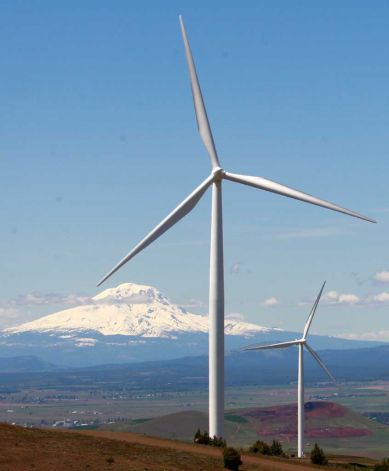forum
library
tutorial
contact

Hydro, Wind Power Seek Peace In Northwest
by Pete DankoEarth Techling, February 15, 2012
|
the film forum library tutorial contact |

|
Hydro, Wind Power Seek Peace In Northwestby Pete DankoEarth Techling, February 15, 2012 |
 The Bonneville Power Administration (BPA), stung by a federal regulatory ruling regarding its treatment of Northwest wind power producers, is proposing new measures -- including splitting the cost for lost revenue -- to mollify the wind producers when an overabundance of hydroelectric power leads BPA to curtail the wind turbines in the region.
The Bonneville Power Administration (BPA), stung by a federal regulatory ruling regarding its treatment of Northwest wind power producers, is proposing new measures -- including splitting the cost for lost revenue -- to mollify the wind producers when an overabundance of hydroelectric power leads BPA to curtail the wind turbines in the region.
BPA sells power from dozens of federal hydro projects in the Northwest, and it controls most of the transmission lines in the region. Federal regulators in December said BPA acted unfairly in shutting off wind power in spring 2011 when a big snowmelt gave it more electricity than it said it needed. BPA's action was opposed by wind generators, led by Portland, Ore.-based Iberdrola Renewables, many of whom lost federal production tax credits and state renewable energy certificates when their turbines were shut down and who worried that BPA's policy could set a precedent that would stifle future support for the industry in the region.
BPA has said that spilling its surplus water could have resulted in an increase of total dissolved gas levels in the water, endangering salmon in potential violation of the Clean Water Act and Endangered Species Act. Wind producers rejected that argument, and cited support from the group Save Our Wild Salmon to back up their claim that BPA wasn't protecting salmon but was simply protecting its own economic interests with the Redispatch Policy.
Under the new proposal, BPA said it would "spill water up to dissolved gas limits." Then, the agency said, it would try to induce thermal and other power plant operators to dial back their own production by offering low-cost or free hydropower "with the expectation that many would voluntarily reduce their generation to save fuel costs."
If all that doesn't do the trick, BPA said it "would then reduce the output of remaining generation within its system, including wind energy, in order of least cost. BPA would compensate the affected generation for lost revenues, including renewable energy credits and production tax credits, subject to audit."
Splitting lost revenue 50-50 could cost up to $50 million in any given year, BPA said, although it expects the compensation to wind producers to average around $12 million per year.
BPA has until early March to submit a proposal to the Federal Energy Regulatory Commission for dealing with the issue. Early signs were that it will have to do more if it wants wind-industry sign-off on its plan.
"BPA's proposed approach focuses primarily on wind generators and money," a spokeswoman for Renewable Northwest Project, a group that includes wind producers among its members, told the Oregonian newspaper. "It should focus on long-term solutions that will actually solve the over-generation issue, increase flexibility for the system, and ensure that the Northwest remains a good place to do business for renewable energy developers."
The current Northwest snowpack is at about 85 percent of normal, making it possible that BPA and the wind producer will be able to sail through the coming spring season with supply and demand in balance and the wind turbines spinning away. But as BPA noted, "conditions can change rapidly."
learn more on topics covered in the film
see the video
read the script
learn the songs
discussion forum
